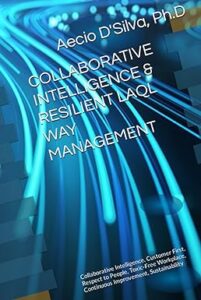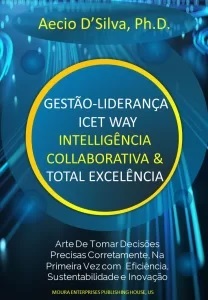A Vision of the Future in Business and Administration of Your Company
By Aécio D’Silva, PhD(1), Maécia Moura, MSc(2), Fabiano Moura, MSc(3)
(1) Moura Enterprises, AquaUniversityTucson, AZ 85742, EUA; (2) Signature Dental Partners, Fênix, AZ 85008; (3) Profound Commerce, Inc. Austin, TX 78746.
Innovating Business and Administration – In today’s fast-paced and competitive business world, companies need to continuously innovate to stay ahead of the game. That’s why more and more companies are turning to innovative, intelligent, and sustainable technologies to transform the way they do business. In this blog, we’ll take a look at some of the cutting-edge technologies that are set to revolutionize business and administration in the years to come.
Innovating Business and Administration – Artificial Intelligence and Machine Learning
Artificial intelligence (AI) and machine learning (ML) are rapidly transforming the way businesses operate. With AI and ML, companies can automate repetitive tasks, improve decision-making processes, and even predict future trends. This technology is particularly valuable for data analysis, customer service, and supply chain management tasks. In the future, we can expect to see AI and ML used even more extensively in business and administration, enabling companies to work smarter, not harder.
For example, AI-powered chatbots can provide 24/7 customer service, handling routine queries and freeing up human customer service representatives to address more complex issues. ML can also be used to optimize supply chain management, predicting demand and ensuring that inventory levels are always optimal. This can help companies to save time and money while improving their overall efficiency.
Innovating Business and Administration – Blockchain
Blockchain is a digital, decentralized ledger technology that allows multiple parties to record and verify transactions in a secure and transparent way. It uses cryptographic techniques to maintain a tamper-proof database that can be shared across a network of computers. Each transaction added to the blockchain is stored in a block and linked to the previous block, forming a chain of blocks, hence the name blockchain. This technology was initially created for the cryptocurrency Bitcoin but has since expanded to many other areas, including finance, supply chain management, and healthcare, among others. Its decentralized nature makes it difficult to hack or manipulate, and it has the potential to improve security, transparency, and efficiency in many industries.
Blockchain technology has the potential to transform many areas of business and administration, particularly those involving transactions and data storage. With blockchain, transactions can be securely and transparently recorded, verified, and tracked, improving the overall security and efficiency of business operations. This technology is particularly valuable in industries such as finance, supply chain management, and healthcare.
In the finance industry, blockchain can be used to improve the speed and security of transactions, while reducing costs. In healthcare, blockchain can be used to securely store and share patient data, improving the quality of care while protecting patient privacy. And in supply chain management, blockchain can be used to ensure that products are ethically and sustainably sourced, tracked, and transported, helping companies to meet increasing consumer demand for transparency and sustainability.
Sustainable Energy and Resource Management
Sustainability is becoming an increasingly important consideration for businesses, as consumers demand more environmentally responsible products and practices. To meet this demand, companies are turning to sustainable energy and resource management technologies, which can help them to reduce their environmental impact while also improving their bottom line.
For example, companies can use renewable energy sources such as solar, wind, and geothermal power to reduce their reliance on fossil fuels and cut their energy costs. They can also use resource management tools to reduce waste, recycle materials, and optimize their use of natural resources such as water and land. By implementing these sustainable practices, companies can not only meet their environmental goals but also improve their overall competitiveness in the market.
In conclusion, the future of business and administration is looking increasingly innovative, intelligent, and sustainable. With technologies such as AI and ML, blockchain, and sustainable energy and resource management, companies can improve their efficiency, reduce costs, and meet the growing demand for environmentally responsible practices. As these technologies continue to develop, we can expect businesses of all kinds to become more competitive, profitable, and sustainable.





